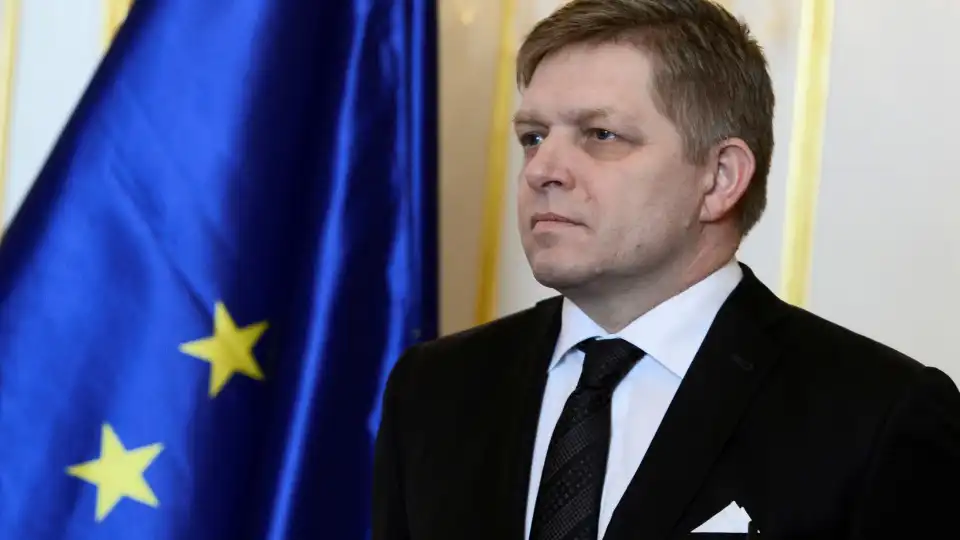Who is Robert Fico, Slovakia's most influential and controversial politician
Slovakia's populist Prime Minister Robert Fico, who is in critical condition after being shot, is leading the country for the third time, taking controversial pro-Russian positions while distancing himself from the European Union (EU).

© Reuters

Mundo Eslováquia
From the leftist Smer party, Robert Fico took over the leadership of the Slovak government for the third time in October of last year - he had already performed these functions between 2006 and 2010 and from 2012 to 2018 -, with a coalition with the pro-Russian extreme right, which earned him the suspension of the European socialists.
The then secretary-general of the PS and Portuguese prime minister, António Costa, asked at the time for an action from the Party of European Socialists (PES) on Fico's party, the Direction - social democracy (Smer-SSD), of social democratic and nationalist origin, stressing that making agreements with the extreme right is a "red line".
Robert Fico campaigned promising to withdraw support for Ukraine and he did: the day after his executive took office, he announced the end of sending weapons to Ukraine, limiting the support of the Slovaks to "humanitarian and civil aid".
The decision implied a change in foreign policy for this country of 5.4 million inhabitants, a member of the EU and NATO, and which has provided substantial aid to Kiev since the beginning of the Russian invasion in February 2022.
His party won 23% in the legislative elections also thanks to an anti-immigration speech that resembles that of Hungarian leader Viktor Orbán, a politician that Fico admires.
Fico, 59, is a very controversial figure in Slovakia.
His initial social democratic positions have changed a lot since he was forced to resign in 2018, following the murder of journalist Jan Kuciak, who was investigating the links between organized crime and political power.
During the covid-19 pandemic, while he was in the opposition, he attacked the restrictions imposed by the government and questioned the effect of the vaccines.
Since his return to power, his controversial reforms, such as the closure of the Anti-Corruption Prosecutor's Office, which was investigating cases linked to his party, and his intention to close the current public radio and television, have led to massive protests.
The parliament is also analysing a law on non-governmental organizations (NGOs) - which obliges them to reveal if they receive foreign funding -, which the opposition compares to similar rules in Russia and Hungary. Fico also campaigned against the rights of the LGBTQ+ community (lesbian, gay, bisexual, trans, intersex and other identities).
Fico's controversial measures are seen by the opposition as an attempt to consolidate his power, limit judicial independence and restrict freedom of the press.
He gained a reputation for his tirades against journalists and faced criminal charges in 2022 for allegedly creating a criminal group and abusing his power.
According to analysts, his aggressive style has caused, in recent years, a decline in public confidence in institutions and exacerbated polarization in society.
The outgoing President, Zuzana Caputová, whom Fico repeatedly insulted and described as an "American agent", said that she did not run for re-election - despite her great popularity - because she could not endure another five years in office due to the death threats that she and her family received.
While in the opposition, the veteran politician knew how to exploit the discontent generated among the underprivileged classes and in rural areas by inflation, the fall in purchasing power and the erratic management of the pandemic by the previous centre-right coalition.
Fico opposes the quotas proposed by the EU for the solidarity distribution of refugees in the European space and criticized the sanctions against Russia after its invasion of Ukraine.
He also stated that he would not authorize the arrest of Russian President Vladimir Putin, under an arrest warrant from the International Criminal Court, if he ever travelled to Slovakia.
Fico began his political career in the Communist Party of Czechoslovakia (KSC) in 1986 and continued in the Democratic Left (SDL) of the reformed communists.
In 1999, he founded the Smer party (direction, in Slovak), which became the main alternative to the liberal reformist program of the centre-right coalitions that governed the country between 1998 and 2006 and, later, between 2010 and 2012.
The Slovak prime minister is "between life and death", after being shot today "several times", in an attack that his executive classified as an "attempted assassination".
The attack took place in Handlova, about 150 kilometres from the country's capital, Bratislava.
Read Also: President of Slovakia says that attack on Fico is "an attack on democracy" (Portuguese version)


Descarregue a nossa App gratuita.
Oitavo ano consecutivo Escolha do Consumidor para Imprensa Online e eleito o produto do ano 2024.
* Estudo da e Netsonda, nov. e dez. 2023 produtodoano- pt.com



